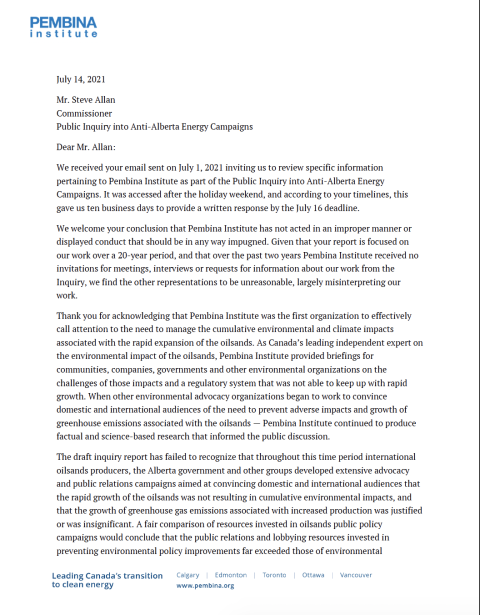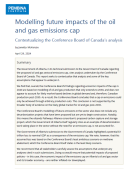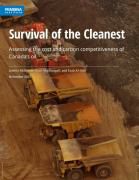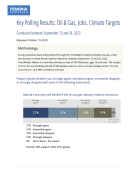July 14, 2021
Mr. Steve Allan
Commissioner Public Inquiry into Anti-Alberta Energy Campaigns
Dear Mr. Allan:
We received your email sent on July 1, 2021 inviting us to review specific information pertaining to Pembina Institute as part of the Public Inquiry into Anti-Alberta Energy Campaigns. It was accessed after the holiday weekend, and according to your timelines, this gave us ten business days to provide a written response by the July 16 deadline.
We welcome your conclusion that Pembina Institute has not acted in an improper manner or displayed conduct that should be in any way impugned. Given that your report is focused on our work over a 20-year period, and that over the past two years Pembina Institute received no invitations for meetings, interviews or requests for information about our work from the Inquiry, we find the other representations to be unreasonable, largely misinterpreting our work.
Thank you for acknowledging that Pembina Institute was the first organization to effectively call attention to the need to manage the cumulative environmental and climate impacts associated with the rapid expansion of the oilsands. As Canada’s leading independent expert on the environmental impact of the oilsands, Pembina Institute provided briefings for communities, companies, governments and other environmental organizations on the challenges of those impacts and a regulatory system that was not able to keep up with rapid growth. When other environmental advocacy organizations began to work to convince domestic and international audiences of the need to prevent adverse impacts and growth of greenhouse emissions associated with the oilsands — Pembina Institute continued to produce factual and science-based research that informed the public discussion.
The draft inquiry report has failed to recognize that throughout this time period international oilsands producers, the Alberta government and other groups developed extensive advocacy and public relations campaigns aimed at convincing domestic and international audiences that the rapid growth of the oilsands was not resulting in cumulative environmental impacts, and that the growth of greenhouse gas emissions associated with increased production was justified or was insignificant. A fair comparison of resources invested in oilsands public policy campaigns would conclude that the public relations and lobbying resources invested in preventing environmental policy improvements far exceeded those of environmental organizations, yet the draft report makes no attempt to do this and even implies the opposite. The report also fails to recognize that the Pembina Institute worked with industry and all levels of government, including Indigenous governments, throughout this time period to advance policy and regulatory solutions to prevent cumulative impacts and to increase action to reduce greenhouse gas emissions.
We note that your most recent terms of reference identified “Anti-Alberta energy campaign” as “an attempt to directly or indirectly delay or frustrate the timely, economic, efficient and responsible development of Alberta’s oil and gas resources and the transportation of those resources to commercial markets, by any means, which may include, by the dissemination of misleading or false information.”
This definition is so broad as to delegitimize all criticisms of oilsands development whatsoever. According to this definition, former Premier Peter Lougheed or the Regional Municipality of Wood Buffalo were “Anti-Albertan” for raising concerns about the pace of oilsands development. Public debate about appropriate conditions concerning natural resource development is a hallmark of a functioning democracy.
Albertans deserve and expect strong environmental policies and the enforcement of environmental laws. Pembina Institute has played a significant public interest role as a fact-based advocate. We are pleased that many of our recommendations have been implemented, although much more needs to be done, particularly to address the growing unresolved issue of unfunded oilsands reclamation liabilities and developing clear policies and a pathway to net-zero emissions in the oilsands — a goal recently adopted by the oilsands sector — 15 years after it was first proposed by Pembina Institute.
Pembina Institute’s pioneering research to highlight the environmental impacts of oilsands development and identify regulatory gaps and policy improvements is in the public interest and has been validated by similar findings from independent bodies such as the Royal Society of Canada, the Commission for Environmental Cooperation, the Auditor General of Alberta, and joint Federal-Provincial panels reviewing oilsands projects. Based on the findings of these and other bodies, there is abundant data that demonstrates oilsands development has not proceeded responsibly and improvements were and continue to be necessary. This information should be reflected in the report. Pembina Institute research has been relied upon by government decision-makers to make necessary improvements in environmental policies. Working to contribute fact-based information and advance environmental improvements should never be considered “Anti-Albertan,” it is disappointing that a formal process under the Public Inquiries Act would appear to accept such a biased premise.
The assessment of Pembina Institute’s work is selective and superficial. When we wrote to the Inquiry in October 2020, we provided links to all our research publications and numerous specific examples of our work to advance improvements in oilsands environmental management, many of which have been embraced by the Government of Alberta and oilsands companies themselves. The draft report does not appear to use or acknowledge this information.
Given the lack of detail provided to us about publicly available information about our grants from international sources, we have not had time to cross reference with our own records, but in general your conclusions that international grants represent a very small portion of our total revenue is consistent with our own assessments and public statements.
The draft report could have referenced the numerous project decision reports highlighting the constructive role that Pembina Institute played as a member of the Oilsands Environmental Coalition where we were consistently recognized by review panels for having legitimate standing and for contributing in a positive way to the decision-making process. You may remember that your original terms of reference and political rhetoric about the purpose of the Inquiry focused heavily on claims of “misinformation.” It should be made clear in the final report that there is absolutely no evidence of any false or misleading information in Pembina Institute research or reports.
Based on our preliminary review of the draft inquiry report in the limited time available, we have concluded that this Inquiry was conceived for political purposes to reduce legitimate scrutiny and debate about the environmental impact of oilsands development and the need for climate action.
The procedural failings of this process are too numerous to address in the time available to us, including untested evidence, reliance on un-named sources and interviews, lack of due process, unreasonable timelines, changes to the terms of reference, and bias. Despite your statement to the contrary within the inquiry report, the report in its current form impugns Pembina Institute and risks further damage to Alberta’s reputation and investment prospects, given its many unsubstantiated claims and lack of recognition of the important and constructive role organizations such as Pembina Institute play in advancing responsible energy development and action on climate change.
As events have shown us this summer with record temperatures and forest fires in western Canada leading to hundreds of deaths, the climate crisis is real and requires more urgency and resources, not less. To insinuate action on climate change is problematic is irresponsible, polarizing, and harmful to Alberta’s long-term interests. Much more ambition and action are needed to reduce greenhouse gas emissions in this province, and we continue to encourage the Government of Alberta to embrace the mainstream consensus that deep reductions in emissions, consistent with our obligations under the Paris Agreement, are necessary for the environment and for Alberta’s future economic prosperity. Pembina Institute will continue to work with leading companies and governments that recognize this goal, and the importance of strong environmental policies that support responsible energy development.
Yours sincerely,
Chris Severson-Baker
Director, Alberta
Pembina Institute








